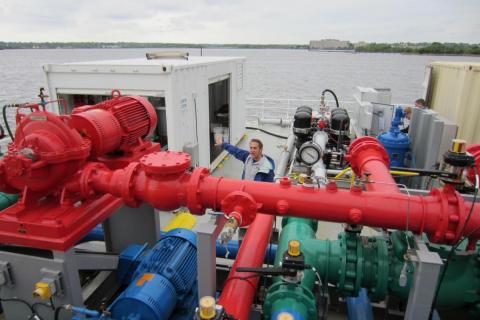University of Maryland scientists are ending their longtime program to help test ballast water treatment systems.
The Maritime Environment Resource Center (MERC) established in 2008 is part of the first Coast Guard-designated independent laboratory for testing and certifying ballast water management systems.
But MERC researchers now say a lack of standardized approaches and oversight “is undermining the fundamental goal of national and international policies to prevent the introduction of environmentally and economically destructive invasive species.”
Both the International Maritime Organization G8 Guidelines and Coast Guard laboratory certification testing process “have resulted in significant uncertainties about the quality and value of test results,” the MERC scientists wrote in a prepared statement announcing the decision.
As a specific example, the scientists say both the Coast Guard and IMO allow test facilities to ignore live larvae of zebra mussels and other mollusks, eggs of various species, and large algae. The rationale: the organisms often do not move on their own, “and under current regulations can be presumed dead,” the Maryland group says.
But it is clear to scientists that those organisms are living and viable, they added. That means the threat of invasive species from ballast water may not be significantly reduced even with certified treatment systems, the scientists warn.
“MERC has a deep understanding of the complexities and challenges associated with testing ballast water management systems against specific discharge standards. While perfection is unrealistic, it is possible to be rigorous, consistent, and transparent when testing BWMSs, which is necessary for the regulations to succeed,” said Dr. Mario Tamburri, the director of MERC and a research professor at the University of Maryland Center for Environmental Science.
“UMCES’ scientific integrity and reputation for providing advice for science-based decision making is of the utmost importance,” said UMCES Chesapeake Biological Laboratory Director Dr. Thomas Miller. “Therefore, under the current regulations, which do not significantly reduce the threat of some invasive species, MERC can no longer conduct BWMS certification testing.”
The group will complete currently contracted testing work before suspending that part of the program. While MERC is pulling back from certification testing, it will continue to work on the ballast water problem.
“MERC remains committed to contributing constructively in future efforts to revise the process for certification of BWMSs at the national and international level,” the researchers wrote, “with the objective of improving upon current BWMS test methods, approaches, and consistency to achieve the fundamental goal of minimizing the risk of invasive species.”




